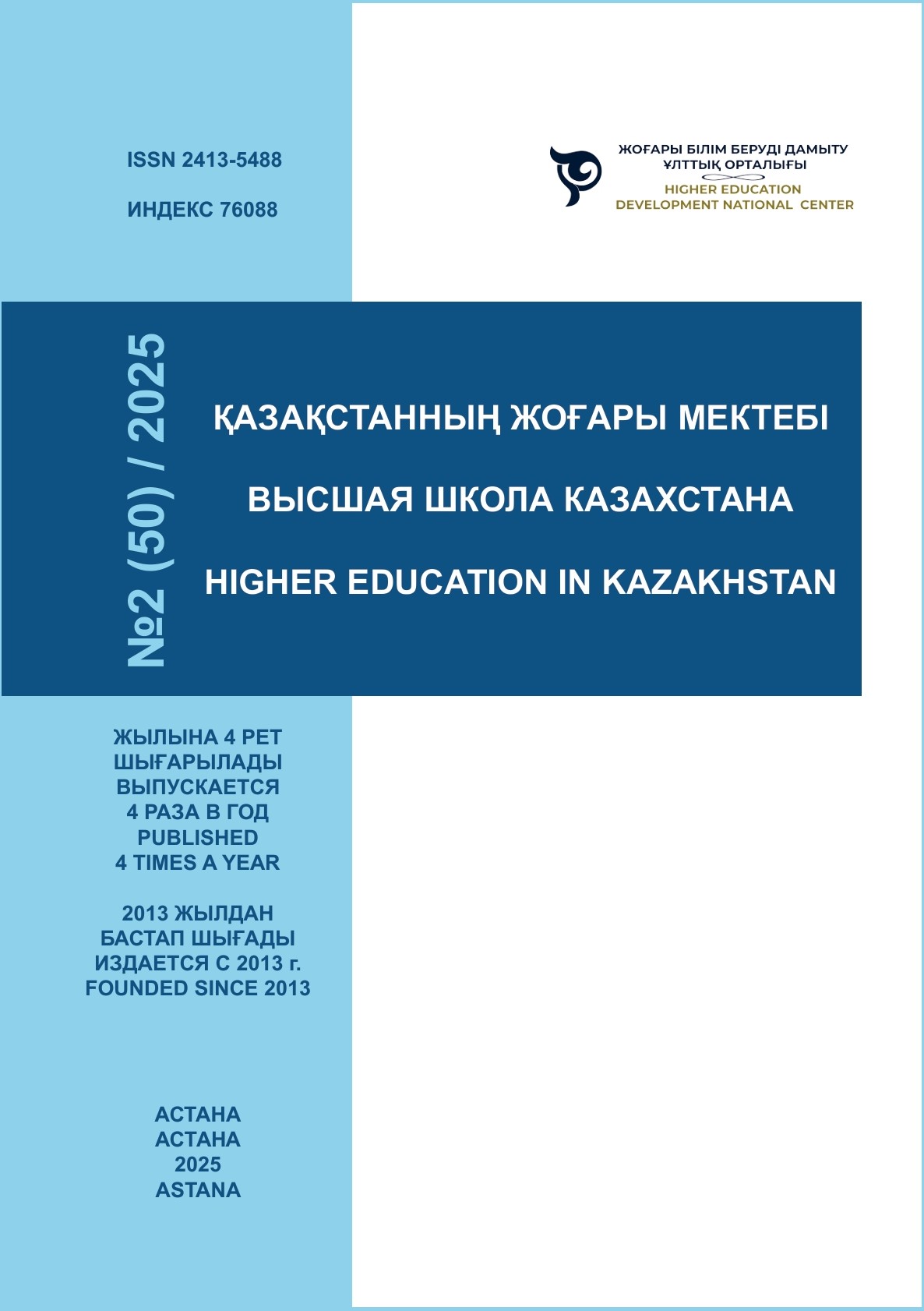MECHANISMS FOR THE INTEGRATION OF SOFT SKILLS, VOLUNTEERING, AND STUDENTS' SOCIAL GPA AT THE UNIVERSITY
DOI:
https://doi.org/10.59787/2413-5488-2025-50-2-135-145Keywords:
soft skills, assessment and evaluation of soft skills, student volunteering, social GPA, integrated GPA.Abstract
The article examines the mechanisms for integrating soft skills, volunteering, and university students’ social GPA. The authors analyze specific features of each concepts and based on identifying their interrelation, propose recommendations for implementing the research results into practical application of social GPA in Kazakhstan universities. They suppose that the findings of the study could be used to improve legal and regulatory framework for scaling up the pilot project on assessing student achievements, taking into account the Integrated GPA (IGPA).
The article’s aim is to identify the mechanisms for integrating soft skills, volunteering, and students’ social GPA. To achieve this goal, following objectives were solved: 1) to establish the correlation between the concepts of “soft skills” and “volunteering” and their interrelation; 2) to determine the role of soft skills within the criteria system of students’ social GPA; 3) to propose recommendations to the scientific and academic community of Kazakhstan regarding the integration of three phenomena under consideration.
The results obtained in the course of solving the objectives allowed authors to conclude that students’ volunteering acts as a socio-pedagogical platform for soft skills development, the combination of which has a significant impact on social GPA level, thereby contributing to students’ personal development.
References
Abbadia, D. (2023). What is triangulation in research: The path to reliable results. Mind the Graph. https://mindthegraph.com/blog/ru/what-is-triangulation-in-research/
Akimzhanova, A. (2021). 21st-century human skills: What you need to know and be able to do. https://manshuq.com/career-new-skills-02-2021
Bakhmatova, T. G., & Zimina, E. V. (2019). Bibliometric analysis of trends in the study of modern media. Questions of Theory and Practice of Journalism, 8(2), 274–291.
Cambridge Dictionary. (n.d.). https://dictionary.cambridge.org/ru/
Drobizheva, L. M. (2014). Civil society and volunteering in modern Russia. Sociological Research, (6), 3–12.
Gavrikov, P. G., & Kosova, A. A. (2020). Experience in using VOSviewer software in epidemiological research: An example of analyzing scientific publications in medical text databases. Bulletin of the Ural State Medical University, (3), 51–53.
Gordienko, O. V. (2024). Modern tools for assessing learning outcomes (2nd ed., rev. and expanded). Moscow: Yurayt.
Kholostova, E. I. (2020). Social work: Theory and practice. Moscow: INFRA-M.
Kosherbayeva, A. N., & Begimbetova, G. A. (2024). Professional development program “Theory and Practice of Pedagogical Measurements” for school leaders. Almaty.
Kosherbayeva, A., & Kasymoyova, G. (2020). Pedagogical measurements: Textbook for students. Almaty.
Kostina, E. A., Akybayeva, G. S., Seydina, M. Z., & Miklyaeva, T. V. (2024). Digital profile of a competency-based university graduate model. Bulletin of Karaganda University. Pedagogy Series, (2)114, 37–47. https://doi.org/10.31489/2024ped2/37-47
Lamri, J., & Lubart, T. (2023). Reconciling hard skills and soft skills in a common framework: The generic skills component approach. Journal of Intelligence, 11(6), 107.
Methodological recommendations for evaluating students’ achievements using IGPA. (2023). Astana. https://surl.gd/ssuvtd
Morgan, H. (2024). Using triangulation and crystallization to ensure credibility and rigor in qualitative research. The Qualitative Report, 29(7). https://nsuworks.nova.edu/tqr/vol29/iss7/4/
Musick, M. A., & Wilson, J. (2008). Volunteers: A social profile. Bloomington: Indiana University Press.
Noah, J. B., & Aziz, A. A. (2020). A systematic review on soft skills development among university graduates. EDUCATUM Journal of Social Sciences, 6(1), 53–68.
Online survey on the topic “Soft Skills.” (n.d.). https://surli.cc/nasgif
Online survey on the topic “Student Volunteering.” (n.d.). https://surl.li/bmcamn
Oxford Learner’s Dictionaries. (n.d.). https://surl.gd/ghufzi
Rao, J. K., Anderson, L. A., Inui, T. S., & Frankel, R. M. (2007). Communication interventions make a difference in conversations between physicians and patients: A systematic review of the evidence. Medical Care, 45(4), 340–349.
Talin, B. (n.d.). 23 skills of the future: Important skills for 21st century workplaces. https://morethandigital.info/ru/23-navyka-budushhego-Vazhnye-navyki-dlja-rabochih-mest-21-go-veka/
The World Economic Forum. (2020). By 2025, 40% of professions will change. Every second person will have to retrain. https://surl.li/leenlk
The World Economic Forum. (2020). Top 10 skills of 2025. https://osvitoria.media/ru/news/svitovyj-ekonomichnyj-forum-nazvav-top-10-navychok-majbutnogo-2
U.S. Army. (1968). Systems engineering of training (CON Reg 350-100-1). U.S. Continental Army Command. https://owenkelly.net/19918/what-might-we-mean-by-soft-skills
United Nations Volunteers. (n.d.). About UNV. https://www.unv.org/about-unv
Van Eck, N. J., & Waltman, L. (2017). Citation-based clustering of publications using CitNetExplorer and VOSviewer. Scientometrics, 2, 1053–1070.
Whitmore, P. G. (1972). What are soft skills? Paper presented at the CONARC Soft Skills Conference, Fort Bliss, Texas. https://en.wikipedia.org/wiki/Soft_skills
Whitmore, P. G., & Fry, J. P. (1974). Soft skills: Definition, behavioral model analysis, training procedures. https://en.wikipedia.org/wiki/Soft_skills
Wilson, J. (2000). Volunteering. Annual Review of Sociology, 26, 215–240.
Yan, L., Yinghong, Y., Lui, S. M. C., et al. (2019). Teaching “soft skills” to university students in China: The feasibility of an Australian approach. Educational Studies, 45(2), 1–17. https://surl.li/thkren
Zhetpisbayeva, B. A., Syrymbetova, L. S., & Akybayeva, G. S. (2022). On the methodology for developing a high school student’s profile. Bulletin of Karaganda University. Pedagogy Series, (3)107, 167–174. https://doi.org/10.31489/2022Ped3/167–174






